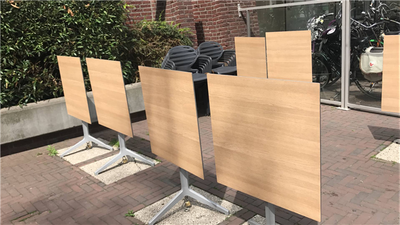HPL veneer, also known as High-Pressure Laminate (HPL), is a versatile and durable surface decoration building material. Widely recognized for its excellent fire resistance, HPL veneer is used in numerous applications, ranging from residential interiors to commercial spaces. Its multiple names—melamine board, fireproof board, decorative board—often stem from regional differences, yet they all refer to the same high-performance material.
In this article, we’ll delve into the characteristics of HPL veneer and explore its varied application fields. Let’s uncover why this material is a go-to choice for modern interior and furniture design.
What is HPL Veneer?
HPL veneer is created through a meticulous process involving multiple layers of kraft paper saturated with phenolic resin. These layers are topped with decorative paper and compressed under high temperature and pressure. The result? A material that boasts unparalleled durability, visual appeal, and functionality.
HPL veneers are predominantly used as surface decoration materials in settings that demand stain resistance, wear resistance, and aesthetic flexibility.
Characteristics of HPL Veneer
1. Wear Resistance
One of the standout features of HPL veneer is its exceptional wear resistance. Made through advanced manufacturing techniques, this material outperforms traditional boards in terms of durability.
Its ability to withstand abrasion makes it ideal for high-traffic areas such as office countertops, public furniture, and flooring. Compared to conventional boards, HPL veneer offers superior cost-effectiveness due to its longevity.
2. Stain Resistance
HPL veneer is widely recognized for its stain-resistant properties. This characteristic is especially crucial in hygiene-sensitive areas such as hospitals, laboratories, and educational institutions.
Surfaces made with HPL veneer are easy to clean, making them a preferred choice for nurse countertops, restroom walls, and even patient room lockers. Its stain resistance, combined with antibacterial properties, has earned it another name: antibacterial board.
3. Environmental Friendliness
In an era focused on sustainability, HPL veneer emerges as a greener alternative to traditional decorative materials. Its paint-free surface eliminates the need for harmful chemicals during production and use, ensuring minimal environmental impact.
Moreover, formaldehyde emissions are controlled, making HPL veneers safer for indoor environments. Whether you call it a paint-free board or eco-friendly laminate, this material checks all the boxes for sustainable design.
4. Versatile Color Options
Design versatility is a hallmark of HPL veneer. From wood grain textures to stone patterns, plain colors, and even custom designs, the color palette offered by HPL veneer is extensive.
This adaptability allows designers to seamlessly integrate HPL veneers into various interior styles, whether modern, rustic, or eclectic. The ability to develop customized patterns further enhances its appeal for bespoke projects.
5. Fire Resistance
As its name suggests, HPL veneer is inherently fire-resistant, making it a safe choice for applications in public spaces like hotels, airports, and educational institutions. Its ability to resist high temperatures adds to its reputation as a reliable building material for safety-conscious designs.
6. Impact Resistance
HPL veneers are robust and can withstand considerable impact, making them suitable for furniture, walls, and other surfaces that experience regular wear and tear. This property further solidifies their position as a long-lasting and resilient decorative material.

Application Areas of HPL Veneer Decorative Boards
1. Furniture Manufacturing
HPL veneers are extensively used in the furniture industry for creating tables, chairs, cabinets, and countertops. Their durability and resistance to scratches and stains make them ideal for residential and commercial furniture.
Furthermore, the wide range of design options allows furniture manufacturers to offer products that are both aesthetic and functional.
2. Musical Instrument Manufacturing
Musical instrument factories utilize HPL veneers to add a decorative touch to instruments such as guitars and pianos. The wood grain textures available in HPL veneers provide an elegant, high-quality finish that enhances the visual appeal of these instruments.
3. Hotels and Hospitality
The hospitality industry relies heavily on HPL veneer decorative boards for walls, reception desks, doors, and even TV cabinets. The combination of aesthetic versatility, fire resistance, and durability ensures that HPL veneers meet the high demands of hotels and resorts.
The ability to customize patterns and finishes makes it easier for hoteliers to align interior decor with their brand identity.
4. Healthcare and Laboratories
HPL veneers are indispensable in healthcare facilities and laboratories due to their antibacterial properties and stain resistance. Surfaces in such environments are exposed to frequent cleaning and chemical usage, and HPL veneers can withstand both without compromising on quality.
5. Retail Spaces
In retail settings, HPL veneers are used for shelves, counters, and displays. Their ability to withstand wear and tear, combined with their visually appealing designs, makes them an ideal choice for stores looking to enhance the shopping experience.
6. Educational Institutions
Schools and universities often use HPL veneers for desks, lockers, and wall paneling. The material’s durability and resistance to graffiti or scratches ensure that it remains functional and attractive, even in high-use environments.
7. Residential Interiors
In homes, HPL veneers are a popular choice for kitchen cabinets, wardrobes, and wall cladding. Their resistance to stains, ease of cleaning, and diverse design options make them a homeowner's favorite for both practicality and style.
8. Transportation Industry
Trains, buses, and airplanes use HPL veneers for interior cladding and furniture. The material’s lightweight yet sturdy nature, combined with fire resistance, makes it an excellent choice for the transportation sector.
Conclusion
HPL veneer decorative boards are an indispensable material for modern interior design and architecture. Their unique characteristics—wear resistance, stain resistance, environmental friendliness, and versatile aesthetics—make them a preferred choice for diverse applications, from healthcare facilities to hospitality venues.
Whether you’re designing furniture, customizing a musical instrument, or upgrading a residential space, HPL veneer delivers the perfect balance of functionality and style. As the demand for sustainable, durable, and visually appealing materials continues to grow, HPL veneers stand out as a reliable and cost-effective solution.
So, if you’re planning your next project, consider incorporating HPL veneer decorative boards—a material that truly redefines surface design.
English
Русский
العربية
Français
Español
Português
Deutsch
italiano
日本語
한국어
Nederlands
Tiếng Việt
ไทย
Polski
Türkçe
አማርኛ
Bahasa Melayu
தமிழ்
Filipino
Bahasa Indonesia
magyar
Română
Монгол
қазақ
Српски
हिन्दी
فارسی
Kiswahili
Slovenčina
Slovenščina
Svenska
українська
Ελληνικά
Suomi
Հայերեն
עברית
اردو
Shqip
বাংলা
Hrvatski
Afrikaans
Māori
සිංහල
Oʻzbekcha
latviešu
Беларуская мова
Bosanski
Български
ქართული
Lietuvių
Malti
Runasimi



